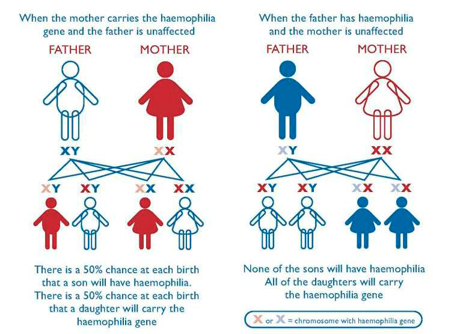Haemophilia is a Sex-linked inheritance and an inherited bleeding disorder where the blood doesn’t clot properly. This is caused when blood does not have enough clotting factor. What is A clotting factor? A clotting factor is a protein in the blood which controls bleeding. Haemophilia has two types. Both of these two types possess the same symptoms.
Haemophilia A: This is the most common form and is due to having reduced levels of clotting factor VIII that’s (8).
Haemophilia B: This can also be referred to as Christmas Disease, is caused by having reduced levels of clotting factor IX that’s (9).
Bleeding as the most common internal. The insufficient in clotting factor brings about a wide range of bleeding episodes, usually into the joints or muscles. These “bleeds”, can occur spontaneously, or because of trauma or injury. Expertise treatment is needed to help blood clot normally and is usually infused or injected into a vein. If internal bleeding is not battle with treatment, it will lead to pain and swelling. As time goes on bleeding into joints and muscles can result in permanent damage such as arthritis, chronic pain and joint damage requiring surgery.

In haemophilia, there three levels of severity which are mild, moderate and severe. These levels of severity depend on the amount of clotting factor in a person’s blood. A person with haemophilia will experience the same level of severity over their lifetime, for example, a person with severe haemophilia will continually have severe haemophilia. In a family, males with haemophilia will also Carrie’s the same level of severity, e.g. if a grandfather has severe haemophilia and his grandson has inherited haemophilia, his grandson will have severe haemophilia also.
It is clearly stated that Haemophilia is an inherited condition and occurs in families; however, in 1/3 of cases ,it appears in families with no previous history of the disorder. The haemophilia gene is transferred down from parent to child through generations. Men with haemophilia will transfer the gene on to their daughters but not their sons. Women with haemophilia gene may transfer the haemophilia gene on to their sons and daughters. Sons with the gene will carry haemophilia. Some women and girls who carry the gene can also experience bleeding problems.
To categorically say this with sincerity that haemophilia has no permanent cure but with appropriate treatment, haemophilia can be managed effectively.